Hydration of alkene - Study guides, Class notes & Summaries
Looking for the best study guides, study notes and summaries about Hydration of alkene? On this page you'll find 48 study documents about Hydration of alkene.
Page 4 out of 48 results
Sort by
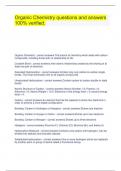
-
Organic Chemistry questions and answers 100% verified.
- Exam (elaborations) • 4 pages • 2023
-
- $13.99
- + learn more
Organic Chemistry questions and answers 100% verified. Organic Chemistry - correct answers.The branch of chemistry which deals with carbon compounds, including those with no relationship to life. Covalent Bond - correct answers.Inter-atomic relationship created by the sharing of at least one pair of electrons. Saturated Hydrocarbon - correct answers.Contain only only carbon-to-carbon single bonds. The most chemically inert of all organic compounds. Unsaturated Hydro...
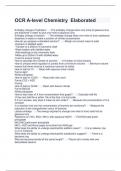
-
OCR A-level Chemistry -
- Exam (elaborations) • 2 pages • 2024
-
- $14.99
- + learn more
OCR A-level Chemistry Elaborated Enthalpy change of hydration - The enthalpy change when one mole of gaseous ions are dissolved in water to give one mole of aqueous ions Enthalpy change of solution - The enthalpy change when one mole of ionic substance dissolves in water to make a solution of infinite concentration How do you prepare a standard solution? - -Weigh out correct mass of solid -Dissolve in distilled water -Transfer to a 250cm^3 volumetric flask -Wash beaker wi...
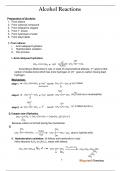
-
Chemistry class 12 most important notes from upcoming exams
- Class notes • 13 pages • 2024
-
- $7.49
- + learn more
From alkene 2. From carbonyl compound 3. From Grignard’s reagent 4. From 1° amine 5. From hydrolysis of ester 6. From alkyl halide 1. From alkene: i. Acid catalysed hydration ii. Hydroboration oxidation iii. Oxo process i. Acid catalysed hydration: CH3 CH CH2 + H2O H + H2 S O4 C H CH3 CH3 O H According to Markonikov’s rule, in case of unsymmetrical alkenes,
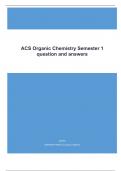
-
ACS Organic Chemistry Semester 1 question and answers
- Exam (elaborations) • 16 pages • 2024
-
- $10.49
- + learn more
formal charge - Correct Answers: group # - lone pairs (NBE) - bonds (1/2 valence electrons) valence electrons - Correct Answers: electrons in the outer most shell Atom - Correct Answers: Smallest particle of an element protons+neutrons surrounded by electrons octet rule - Correct Answers: States that atoms lose, gain or share electrons in order to acquire a full set of eight valence electrons Pauli Exclusion Principle - Correct Answers: An atomic orbital may describe at most ...
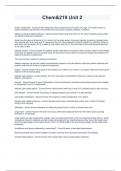
-
Chem&219 Unit 2
- Exam (elaborations) • 7 pages • 2024
-
- $15.49
- + learn more
Acyclic compounds - Correct Answer Molecules whose skeletons do not contain any rings. The carbon chains of acyclic molecules can be linear or branched and may consist of alkanes, alkenes, or alkynes. Addition of Acids to Alkenes/Alkynes - Correct Answer When acids (HCl, HBr, HI, HF, and H-OSO3H [sulfuric acid]) are added to alkenes or to alkynes. Acids have the general structure of H-A, where H is the acidic proton (the proton typically donated or released when the molecule acts...
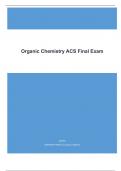
-
Organic Chemistry ACS Final Exam
- Exam (elaborations) • 10 pages • 2024
-
- $13.49
- + learn more
Functional group of alcohol - Correct Answers: hydroxyl Functional group of aldehyde - Correct Answers: carbonyl Functional group of amide - Correct Answers: carboxamide Functional group of amine - Correct Answers: amino Functional group of carboxylic acid - Correct Answers: carboxyl Functional group of ester - Correct Answers: ester Functional group of ether - Correct Answers: ether Functional group of halide - Correct Answers: halogen Functional group of ketone - C...
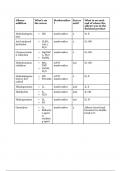
-
CHEM 220 alkene addition final products
- Class notes • 1 pages • 2024
-
- $7.99
- + learn more
This study guide summarizes the key aspects of alkene addition reactions, including the reagents used, the regioselectivity (Markovnikov or anti-Markovnikov), and the products formed. The guide provides a concise summary of the reactions, with a focus on the functional groups added to the alkene and the stereochemistry of the addition. The reactions covered include hydrohalogenation, acid-catalyzed hydration, oxymercuration-reduction, hydroboration-oxidation, hydrohalogenation by free radicals, ...
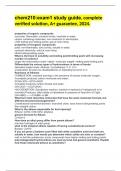
-
chem210:exam1 study guide, complete verified solution, A+ guarantee, 2024.
- Exam (elaborations) • 6 pages • 2024
-
- $11.55
- + learn more
chem210:exam1 study guide, complete verified solution, A+ guarantee, 2024. properties of organic compounds non-polar; flammable; covalent bonds; insoluble in water; carbon containing molecules; non-conductor in electrolytes; LOW boiling and melting points; gas at room temp. properties of inorganic compounds polar; non-flammable; ionic bonds; soluble in water; conducts electricity; solid at room temp; HIGH boiling/melting points What is the trend in solubility and boiling point/melting...
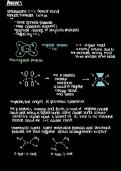
-
Lecture notes 1.4 alkenes (Chem)
- Class notes • 8 pages • 2024
-
- $9.39
- + learn more
Alkenes are a class of hydrocarbons that contain at least one carbon-carbon double bond (C=C). Here are the key points about alkenes: Structure General Formula: The general formula for alkenes is C n H 2 n C n H 2n , where n n is the number of carbon atoms. Double Bond: The presence of a carbon-carbon double bond defines alkenes. This double bond consists of one sigma (σ) bond and one pi (π) bond. Nomenclature Naming: Alkenes are named by identifying the lo...

-
Organic Chemistry 1 Chapters 7 and 8
- Class notes • 9 pages • 2023
- Available in package deal
-
- $12.49
- + learn more
Chapter 7 is a two week long chapter that introduces substitution and elimination reactions. Students will learn the reaction mechanisms for Sn1, Sn2, E1 and E2 reactions. They will also begin to understand the difference between protic and aprotic solvents, as well as what reagents are weak or strong nucleophiles and/or weak or strong bases. Understanding this concept will allow students to decide when a reaction will be an elimination and/or substitution reaction. These notes provide in-depth ...

$6.50 for your textbook summary multiplied by 100 fellow students... Do the math: that's a lot of money! Don't be a thief of your own wallet and start uploading yours now. Discover all about earning on Stuvia


